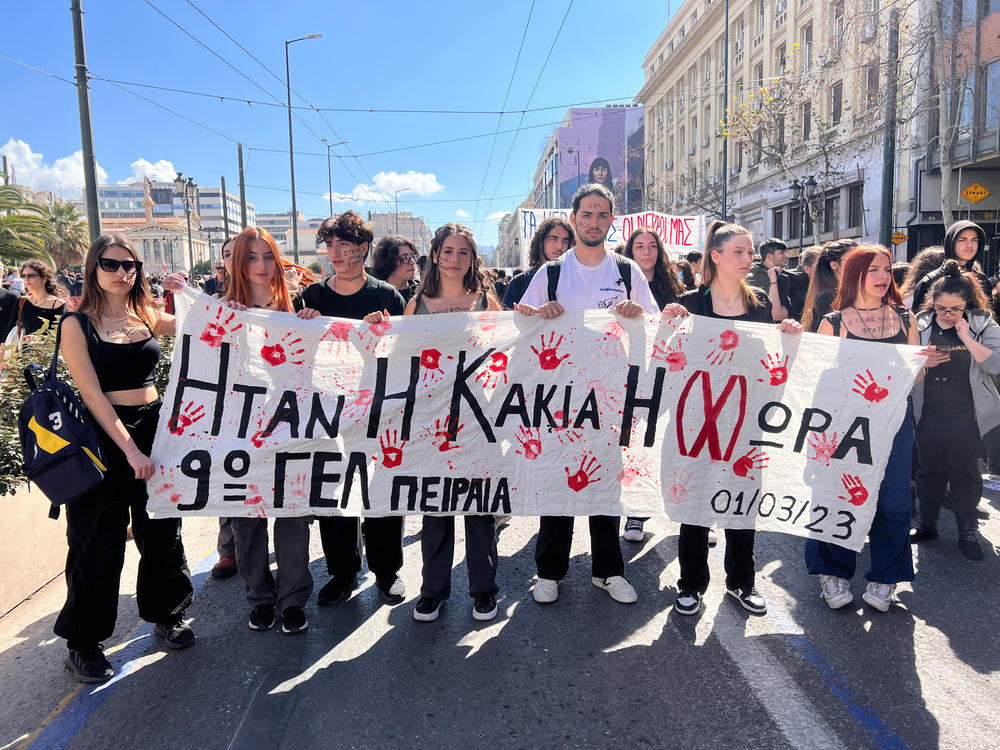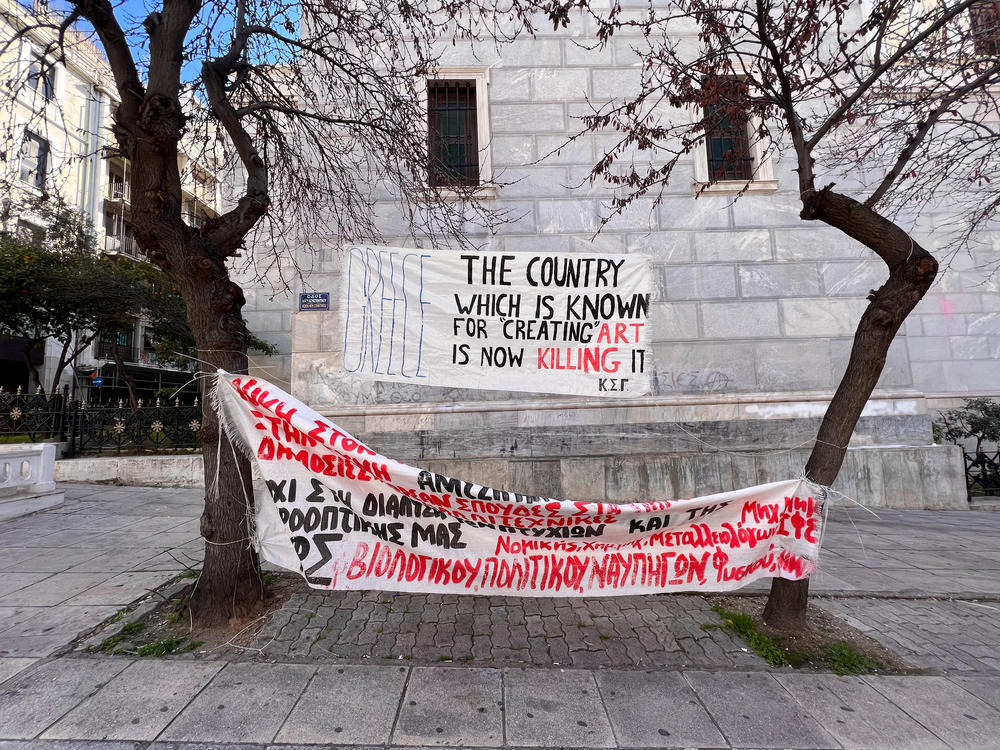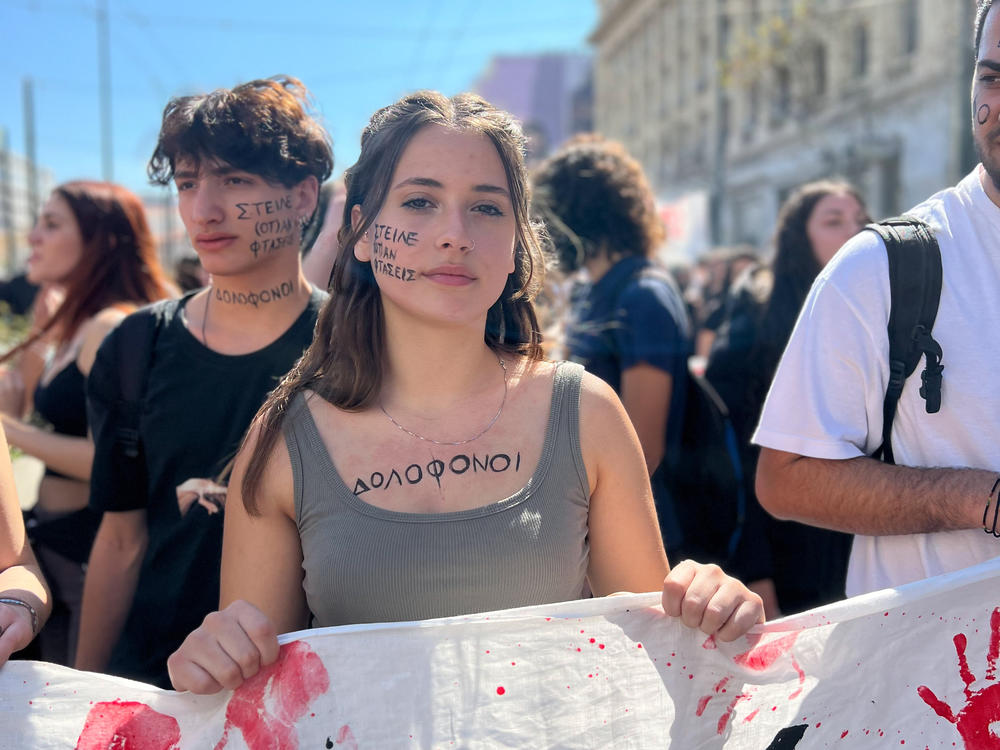Section Branding
Header Content
After Greece's worst train crash, young Greeks rally for change ahead of elections
Primary Content
Updated March 22, 2023 at 6:52 AM ET
ATHENS, Greece — High school junior Stella Dourou would typically be in class on a weekday. But on a recent Thursday morning, Dourou marched through downtown Athens, alongside her classmates and tens of thousands demonstrating in the Greek capital.
"We're protesting for all the lives lost for no reason," said Dourou, who knew one of the 57 people killed in last month's train collision, the deadliest in Greece's history.
Outrage over the collision — which many see as the result of government neglect of railway safety systems and protocols, despite years of warnings from rail unions — has galvanized Greeks of all ages and backgrounds to participate in massive demonstrations across the country, believed to be the biggest since the anti-austerity riots in 2010.
But the tragedy seems to have struck a chord with the country's youth because many of the train passengers were students returning home after a long holiday weekend.
"It could have been me," Alexia Athanasiou, 20, told Greek media the week of the accident, in an impassioned statement that went viral on TikTok.
Athanasiou said a Larissa stationmaster who appears to have failed to switch the train tracks, putting the two trains on a collision course, was partly responsible. He was charged with negligent homicide and is jailed pending trial. But she also blamed Greek society.
"We are all at fault," she said, for repeatedly electing the same people.
The rail crash marks a defining moment for Greece's Generation Z and young millennials, said Costas Gousis of Eteron, a nonprofit tracking top issues for Greeks in their teens and 20s.
"We're seeing the shaping of a new political generation in Greece," Gousis said.
Even before the collision, many young Greeks were disillusioned over limited educational and professional opportunities in the country, working conditions, and gender inequality.
"You could see it coming — that this is a generation that at some point will say, 'This is enough. We can't live this way. We want something different,' " Gousis said.
Students protest over university police and other recent issues
Since the beginning of the coronavirus pandemic, sometimes with lockdown restrictions in place, students across the country protested plans to place police on university campuses and against police brutality. They demonstrated during Greece's MeToo moment, and over a wave of femicides.
Today, young artists are protesting a December government decree that they say downgrades performance arts degrees to the equivalent of a high school diploma and will impact their salaries, among other things. Students have occupied more than two dozen performing arts schools and theaters and are also revolting against what they describe as moves to privatize Greek education.
For many young Greeks, who grew up in the aftermath of a devastating financial crisis, the crash was the crash underscored the country's "deep, structural, fundamental problems," said Nick Malkoutzis, editor and co-founder of MacroPolis, a political and economic analysis website.
"I think a lot of those young people will ... wonder if their future lies here or if there is any real possibility of things changing for the better. And that's a really depressing thought," Malkoutzis said. "I really sort of feel for them."
Tragedy spurs some young Greeks into political action
Some young Greeks who spoke with NPR doubted the backlash to the tragedy will lead to meaningful change. But others are hopeful.
Actor Thalassini Vostatzoglou, 27, said she has not been particularly active in protests and elections because Greece's political discourse and system feel helplessly polarized and immutable. But the recent decree impacting performing arts students and professionals, as well as the collision, has changed her outlook.
"For the first time in my life, I think it's essential to take part," she said.
Mike Mourtzis, 20, a university student studying economics, said the train tragedy will be top of mind when he casts his ballot in the national elections in May.
Mourtzis hopes he and his peers will buck the historically low youth voter turnout rates. "I think we're going to make a great change this year in the elections," he said.
The voting age in Greece is 17.
Opinion polls since the collision suggest waning support across the board for the governing New Democracy party and the Greek prime minister, who is also facing accusations of spying on political opponents and journalists.
In 2019 Syriza, the current opposition party, had the biggest share of votes from those aged 17-34.
"When you see all the choices laid out in front of you, and you've seen how these choices worked out in the past, you don't really want to vote for these people again," said Despina, a chemical engineering master's student in Ptolemaida, a town in northern Greece.
Despina, who requested only her first name be used over privacy concerns, was one of several young Greeks who told NPR they are researching their options and plan to vote for smaller political parties.
The current disillusionment with the political establishment, echoed widely by Greeks young and old, is "extremely dangerous" because it could give rise to far-right fringe parties, warned Aristides Hatzis, a professor of legal theory at the University of Athens.
In the aftermath of the Greek financial crisis and amid harsh austerity measures, Golden Dawn — a neo-Nazi party that has since been deemed a criminal organization — capitalized on widespread anger toward mainstream politics and rose from a fringe party to the third largest in Greek parliament.
"I want to believe that something will change for the better in these elections," Vostatzoglou, the actor, said. "Because if it doesn't, young people will rightfully lose hope."
Copyright 2023 NPR. To see more, visit https://www.npr.org.
Bottom Content



